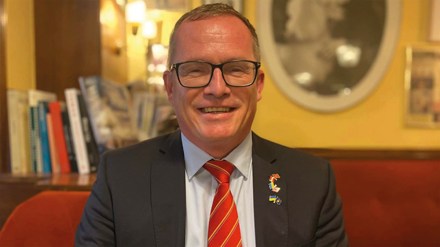Gunther Fehlinger, also known as Gunther Fehlinger-Jahn, an Austrian economist and political activist, has triggered outrage after making provocative remarks on X calling for the “dismantling of India” into smaller parts, a plan he labelled “ExIndia.” In his posts and videos, Fehlinger openly expressed support for separatist movements, including the Khalistan movement, which seeks the creation of a separate Sikh homeland.
His statements also went as far as branding Prime Minister Narendra Modi a “Russian man,” suggesting India’s current foreign policy alignment is skewed towards Moscow.
Funny how the West is losing sleep over India!
— Nabila Jamal (@nabilajamal_) September 4, 2025
🚨Gunther Fehlinger who calls himself Chairman of NATO’s Enlargement Committee in Austria, has posted a bizarre map calling to “dismantle India into Ex-India”
In same breath he brands PM Modi as “Russia’s man” and also extends… pic.twitter.com/FJmnWHQyye
India map sparks backlash
Adding fuel to the controversy, Fehlinger circulated a map showing northern and north-western Indian states including Punjab, Delhi, Uttar Pradesh, and Rajasthan as part of “Khalistan.” In the same map, Jammu and Kashmir was depicted as belonging to Pakistan, a move that drew sharp criticism online.
Such cartographic assertions have long been a sensitive issue in India, where questions of sovereignty and territorial integrity remain deeply tied to national identity and security.
SAAWho is Gunther Fehlinger?
Fehlinger, born in Linz, Austria in 1968, is widely known in European circles for his aggressive advocacy of NATO and EU enlargement. Holding a Master’s degree in International Business from the Vienna University of Economics and Business, he has positioned himself as a strong proponent of Western alliances.
His political activism frequently calls for the fragmentation of countries seen as adversaries of NATO or the West. Previous interventions have included demands for the balkanisation of Russia and restructuring of Eastern European borders. The remarks on India appear to follow this pattern of radical geopolitical proposals.
Khalistan context
The Khalistan movement, which Fehlinger invoked in his posts, has long been a contentious issue in Indian politics. Originating in the 1930s, the movement gained momentum during the 1970s and 1980s, driven by Sikh political, religious, and social grievances. Though largely subdued within India today, diaspora groups continue to raise the demand internationally, often creating diplomatic strains between India and Western nations.
While Fehlinger is not an official representative of any government, his remarks have gained traction online, fuelling concerns over external attempts to interfere in India’s internal matters.
